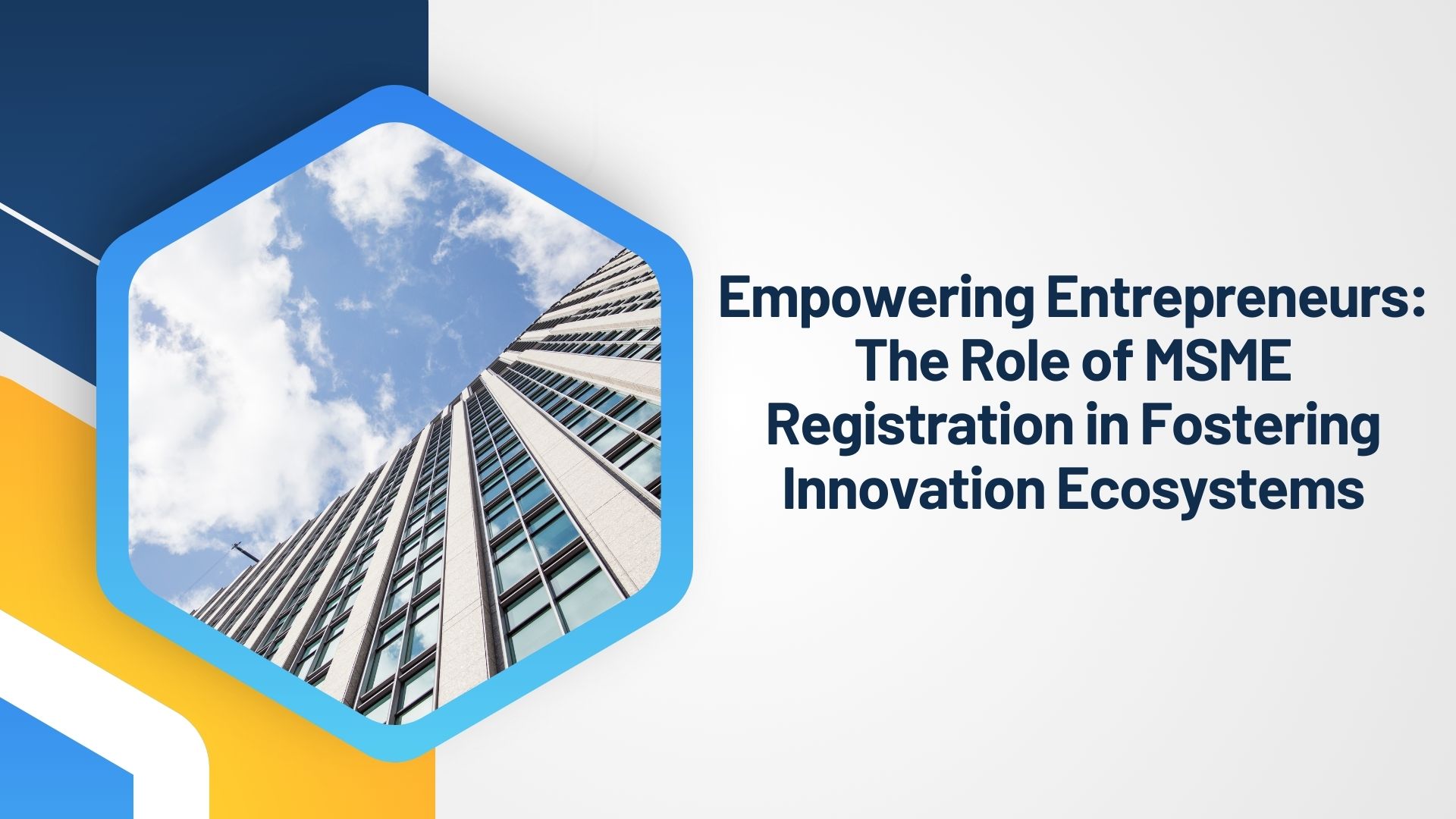In today’s dynamic business landscape, fostering innovation is paramount for economic growth and sustainable development. Small and Medium Enterprises (SMEs) play a pivotal role in driving innovation, creating jobs, and fueling economic progress. However, for SMEs to thrive and contribute effectively to innovation ecosystems, they require adequate support and recognition from governmental bodies. This is where MSME (Micro, Small, and Medium Enterprises) registration steps in as a catalyst for nurturing entrepreneurship and innovation.
Understanding MSME Registration
MSME registration is a government-initiated scheme designed to provide benefits and support to businesses falling within the prescribed criteria of micro, small, and medium enterprises. These criteria typically include factors such as investment in plant and machinery/equipment and turnover of the enterprise. By registering under the MSME framework, businesses gain access to various incentives, subsidies, and support mechanisms aimed at fostering their growth and sustainability.
Driving Innovation Through MSME Registration
Access to Financial Support:
One of the primary challenges faced by SMEs is access to finance. MSME registration opens doors to a plethora of financial support schemes, including subsidized loans, credit guarantees, and interest rate concessions. This financial assistance enables SMEs to invest in research, development, and innovation without being burdened by exorbitant interest rates or stringent collateral requirements.
Technology Upgradation:
Innovation often goes hand in hand with technological advancements. Through MSME registration, businesses can avail themselves of subsidies and incentives for adopting modern technologies, upgrading their infrastructure, and enhancing their production processes. This facilitates the integration of innovative practices and fosters a culture of continuous improvement within SMEs.
Research and Development (R&D) Support:
MSME registration encourages enterprises to allocate resources towards research and development activities. Governments often provide grants, tax incentives, and subsidies to MSMEs engaged in R&D initiatives aimed at developing new products, processes, or services. This not only enhances the competitiveness of SMEs but also contributes to the overall innovation ecosystem by fostering the creation of cutting-edge solutions.
Market Expansion:
MSME registration opens up opportunities for SMEs to participate in government procurement processes and access larger markets. Governments often have procurement quotas reserved for MSMEs, providing them with a platform to showcase their innovative offerings and compete on a level playing field with larger corporations. Moreover, MSME registration enhances the credibility and visibility of businesses, making it easier for them to attract potential customers and partners in domestic and international markets.
Skill Development and Capacity Building:
Innovation thrives in an environment where talent is nurtured and skills are continuously honed. MSME registration facilitates skill development and capacity building through training programs, workshops, and knowledge-sharing initiatives. By investing in the professional development of their workforce, SMEs can unleash the full potential of their human capital and drive innovation across various domains.
Case Studies: MSME Registration in Action
Tech Start-up Acceleration:
In India, the MSME registration framework has played a pivotal role in nurturing the burgeoning tech start-up ecosystem. By providing access to seed funding, incubation support, and mentorship programs, MSME registration has empowered aspiring entrepreneurs to transform their innovative ideas into viable businesses. Start-ups registered under the MSME category have thrived in sectors ranging from fintech and e-commerce to healthcare and agritech, driving disruptive innovations and creating significant value in the process.
Artisanal Revival:
In countries like Mexico and Indonesia, MSME registration has been instrumental in revitalizing traditional artisanal industries. By providing artisans with access to financial assistance, market linkages, and design interventions, governments have empowered them to preserve their cultural heritage while embracing modern techniques and technologies. MSME-registered artisanal enterprises have successfully tapped into niche markets, both domestically and internationally, showcasing their unique craftsmanship and fostering cross-cultural exchange.
Suggested Read: New MSME Registration Process
Conclusion
Innovation is the cornerstone of economic progress, and MSME registration serves as a linchpin in fostering vibrant innovation ecosystems worldwide. By providing SMEs with the necessary support, incentives, and recognition, governments can unlock their potential as engines of growth and agents of change. As we navigate the complexities of the global economy, it is imperative to recognize the pivotal role of MSMEs in driving innovation, creating jobs, and fostering inclusive development. Through concerted efforts and strategic interventions, we can unleash the full potential of SMEs and build a future where entrepreneurship thrives, and innovation knows no bounds.
















